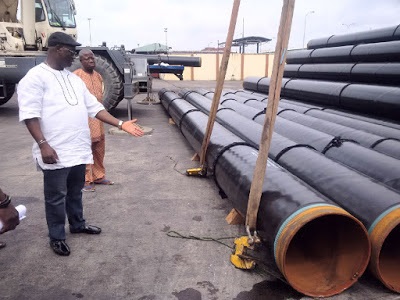Achieving Port Efficiency In Nigeria: How Possible?
 Nigeria is a nation in dire need of exploiting international trade to boost its economic activities and overcome its current recession therefore the nation craves for efficiency in its port operations. Efficient ports have proven to be major drivers of trade and economic activities across several countries.
Nigeria is a nation in dire need of exploiting international trade to boost its economic activities and overcome its current recession therefore the nation craves for efficiency in its port operations. Efficient ports have proven to be major drivers of trade and economic activities across several countries.
Estimates from the research organized by the Lagos Chamber of Commerce and Industry (LCCI) show that Nigeria loses over a trillion naira annually within the port and business community due to inefficiencies and inherent shortcomings of the nation’s maritime ports.
Nigerian ports have increasingly seen a rise in gross tonnage (GT) by 3.3% which compounded annual growth rate to 144.2 million tons within the past five years, yet the cost of trading goods remains a major hurdle with the import and export time’s reduction of 25% and 6% respectively since 2013, Nigeria’s seaports still rank as the most expensive in West Africa. On imports, extra costs related to yard handling fees (which include demurrage and storage) represent an extraordinary 77% of the total cost, driven by longer-than-ideal border clearance times, yard handling procedures, and informal payments to Customs and other government agencies.
The factors mitigating port efficiency in Nigeria are numerous; they include infrastructural challenges, policy and regulatory inconsistencies, overlapping functions and duplication of roles among the Ministries, Departments and Agencies (MDAs) operating at Nigerian ports.
Nigeria has recorded sustained increase in annual inflation rate to 17.85% in September 2016 (from 17.61% in August 2016) the highest since February 2009.
Nigeria’s Vice President, Prof. Yemi Osinbajo recently noted that there was a collaboration between the ease of doing business in the country and economy prosperity.
According to him, the maritime sector needs reforms to improve the ease of doing business in Nigeria particularly trading across borders to guarantee investments both foreign and domestic, Industrialization, etc., which are tools to develop the nation’s economy and ensure poverty reduction.
“The federal government is focusing on providing infrastructure; both hard and soft, to improve the ease of doing business in this nation. A deliberate well cut-out automation strategy for ports is in the offing in order to achieve the goal of blocking revenue leakages, improving the processes and efficiency, and reducing human interferences.
“It is notable that since automation was introduced to the ports revenue has increased by over 25%. Actually, revenue increased from N57billion in 2005 to N124billion in 201” the Vice President said at the recent LCCI event where he was represented by the SSA to the President on Industry, Trade and Investment, Dr. Jumoke Oduwole.
The Vice President also highlighted some factors the federal government was working on to guarantee efficiency of the nation’s ports to include; the harmonization of operations at the ports, introduction of the Single Window, 24 hours port operations, designating terminals for exportation of agricultural produce, etc.
In order to achieve this, Osinbajo stressed that the private sector had to collaborate with the federal government in implementing its laudable objectives towards enhancing port efficiency.
The Minister of Transportation, Rt. Hon. Rotimi Amaechi has also revealed that the federal government was doing its best to develop a transportation masterplan and also develop the non-oil sector of the economy, while he stated that the nation’s non-oil exports had increased significantly in the last six months.
Amaechi said this in his keynote address at the same event where he was represented by the DG NIMASA, Dr. Dakuku Peterside.
Amaechi noted that that economic recession has seen Nigeria shift focus to on non-oil export and he advocated more of such activities to provide employment and guarantee foreign exchange for the nation.
“Our economy cannot operate in isolation so we must work in sync with other factors globally. Our ports must at every point in time remain competitive. If our ports aren’t optimized, the utility would go elsewhere. The Federal Ministry of Transportation is committed to developing a national transport master plan to facilitate the diversification of the economy and also improve the non oil sector revenue.
“Henceforth, emphasis would be on opening up the potentials of the maritime sector by attracting investments to boost government revenue and guarantee employment for our teeming youth” Amaechi said.
He also stated that the government was doing its best to rectify the challenges facing the ports. He highlighted some of the areas to include the bad port access roads, inadequate trucks and congested ports.
Citing other criteria that would also ensure efficiency of port operations, the Executive Secretary of the Nigerian Shippers Council (NSC) emphasized that freight forwarding should not be left to touts.
According to the Shippers’ Council boss the activities of freight forwarders was germane to transforming the sector, hence the practice should be exclusively for professionals.
“Freight forwarding should be for professionals and that is why we have the Council for Regulation of Freight Forwarders in Nigeria (CRFFN), to ensure the profession isn’t an all comers affair. Just like a lawyer, a freight forwarder needs to meet a certain criteria before he can practice.
“Freight forwarders act as agents of shippers and sometimes carriers. They perform such important role hence; there is need for some consolidation. We want freight forwarders to have a minimum share capital to operate; we need them to have offices and not briefcases. We need them to also function as truckers, chatter vessels, own warehouses, etc” Hassan Bello said.
However, he noted that the economic challenges facing the nation may have equally crippled freight forwarders. He maintained that as the Nigerian economy grows, we are going to have such freight forwarders.
Meanwhile, the Director General of the Nigerian Maritime Administration and Safety Agency (NIMASA), Dr. Dakuku Peterside asserted that the nation was already taking giant steps towards ensuring port efficiency as the newly launched Standards Operating Procedures (SOP) for agencies at the ports was as massive development.
“The ports can function differently and deliver better results if certain things are put in place. One of such issues is the newly launched Standards Operating Procedures for all actors in the port known to stakeholders. This would ensure that a port user knows what to expect from NPA, NIMASA, SON, etc.
“Another important thing is the Single Window which would help eliminate physical contact because everything would be done online via a single platform especially the payment of charges. This would curb the level of human contact and corruption” Dakuku said.
By Kenneth Jukpor







